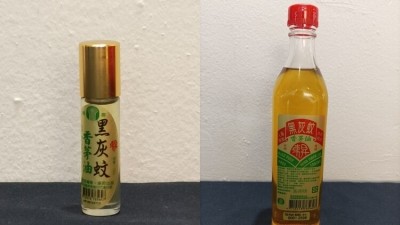Natural repellent: Strong demand for novel Taiwanese black root citronella in Singapore as dengue cases surge
![3D illustration of the dengue virus, which causes yellow fever and transmitted by the Aedes aegypti mosquito. [Getty Images]](/var/wrbm_gb_food_pharma/storage/images/_aliases/wrbm_large/publications/cosmetics/cosmeticsdesign-asia.com/article/2022/08/08/novel-black-root-citronella-oil-gains-traction-in-light-of-singapore-dengue-uptick/15663753-1-eng-GB/Novel-black-root-citronella-oil-gains-traction-in-light-of-Singapore-dengue-uptick.jpg)
The burgeoning sales did not include stocks of spray bottles at 60ml and 100ml and 500ml containers for heavy-duty use, said George Tan, director of the Singapore firm introducing it called Newrange.
Conventional citronella plants have brown or greenish roots and look similar to lemongrass. However, Dong Sheng is made with oil produced from a novel citronella family species with black roots and tea tree oil as a base.
Tan claimed that the novel citronella oil was more potent as it could tackle new mutations of the dengue-carrying Aedes aegypti mosquitoes.
“This is a new type of citronella with black roots. There are many citronella oils and products in the market, but their scents do not last long enough,” said Tan.
Every two months, he imports around 60 to 70 cartons of distilled oil in various glass bottle sizes from Taiwan. Each carton could store approximately 600 roll-ons.
A 10ml roll-on retails for SG$8 (US$5.80), 60ml spray at SG$20 (US$14.50), 100ml spray at SG$28 (US$20) and a 500ml container at SG$90 (US$65). The oil could be purchased from e-commerce platforms such as Carousell and social media through Facebook Live and various retail outlets across Singapore.
Tan’s sales representative, Toh Puay Siong, explained that the hypoallergenic oil is produced under the supervision of the agricultural committee of Miaoli county (western Taiwan). It is claimed safe for topical application and has no expiration date. The oil could also be sprayed or diffused in homes or cars or added to floor-cleaning liquids before mopping.
It is not to be consumed orally, and pregnant or nursing mothers should consult a physician first. It is also recommended to conduct a patch test.
Dengue uptick
The National Environment Agency (NEA), a public entity responsible for maintaining a clean and sustainable environment in Singapore, reported a total of 1,104 dengue cases in the week ending 30 July 2022, or 48 cases more than the previous week. The numbers were compiled by the Communicable Diseases Division of the Ministry of Health (MOH).
Close to 22,000 cases have been reported this year – exceeding the total of 5,258 cases reported in 2021.
“The weekly number of cases is still very high, and we are in the early months of the traditional peak dengue season in Singapore,” said NEA in a statement published on 28 July.
In June 2022, the Aedes aegypti mosquito population, the primary dengue vector, remained high in Singapore and was 2 per cent higher than in the same period last year in June 2021.
As of 1 August 2022, there are 275 active dengue clusters in the republic, with 96 considered red alert (a cluster with 10 or more cases), and involving 400,000 households. Upon further analysis, the dengue virus serotype 3 (DENV-3) was also detected in 85 of the 96 red alert clusters.
The large Aedes aegypti mosquito population, combined with circulation of the previously uncommon DENV-3, would likely lead to dengue case numbers remaining high in the coming months, warned NEA.
On the use of citronella oils, two unrelated original studies by David Alavez-Rosas et al. (2022) and Hemanga Hazarika et al. (2022) showed that the essential oils could repel insects and reduce mosquito bites with moderate results. The teams also discovered that a more potent repellent would comprise a mix of citronella with other oils to increase chemical compound diversity against the Aedes aegypti.
The conclusions could assist researchers and formulation scientists develop effective, safe and longer-lasting herbal mosquito repellents for travellers, the military in jungle operations or the general public in mosquito-endemic areas.

![We dive into our most-read stories on formulation and science. [Getty Images]](/var/wrbm_gb_food_pharma/storage/images/_aliases/wrbm_medium/publications/cosmetics/cosmeticsdesign-asia.com/article/2022/07/27/skin-science-top-five-stories-on-cosmetics-science-and-formulation/15626226-3-eng-GB/Skin-science-Top-five-stories-on-cosmetics-science-and-formulation.jpg)
![Kao Corporation will launch its new mosquito repellent in Indonesia next year. [Kao Corp / Bioré]](/var/wrbm_gb_food_pharma/storage/images/_aliases/wrbm_medium/publications/cosmetics/cosmeticsdesign-asia.com/headlines/brand-innovation/kao-corp-to-expand-launch-of-novel-mosquito-repellent-to-indonesia-in-2023/15537065-1-eng-GB/Kao-Corp-to-expand-launch-of-novel-mosquito-repellent-to-Indonesia-in-2023.jpg)
![Biologi has introduced an anti-pollution serum which it believes is its most exciting launch to date. [Biologi]](/var/wrbm_gb_food_pharma/storage/images/_aliases/wrbm_medium/publications/cosmetics/cosmeticsdesign-asia.com/headlines/brand-innovation/biologi-s-most-exciting-serum-launch-features-wild-harvested-extract-that-protects-against-pollution/15470602-1-eng-GB/Biologi-s-most-exciting-serum-launch-features-wild-harvested-extract-that-protects-against-pollution.jpg)






![Indus Valley is working to corner 30% of India's online premium boxed hair colour market. [Indus Valley]](/var/wrbm_gb_food_pharma/storage/images/_aliases/wrbm_tiny/publications/cosmetics/cosmeticsdesign-asia.com/article/2024/07/26/indus-valley-aims-to-secure-30-of-india-s-online-premium-hair-colour-market-with-organic-offerings/17594932-5-eng-GB/Indus-Valley-aims-to-secure-30-of-India-s-online-premium-hair-colour-market-with-organic-offerings.jpg)
![[Getty Images]](/var/wrbm_gb_food_pharma/storage/images/_aliases/wrbm_tiny/publications/cosmetics/cosmeticsdesign-asia.com/china/china-focus-latest-developments-in-china-s-booming-beauty-market25/17606695-1-eng-GB/China-focus-Latest-developments-in-China-s-booming-beauty-market.jpg)
![Kosé has launched makeup brand Visée in Singapore as part of plans to reinforce its position in SEA. [Visée]](/var/wrbm_gb_food_pharma/storage/images/_aliases/wrbm_tiny/publications/cosmetics/cosmeticsdesign-asia.com/headlines/business-financial/visee-singapore-kose-aims-to-enhance-brand-visibility-in-sea-with-new-launch/17587264-1-eng-GB/Visee-Singapore-Kose-aims-to-enhance-brand-visibility-in-SEA-with-new-launch.jpg)
![ble C&C is set on reinforcing its competitiveness in China’s beauty market. [Missha]](/var/wrbm_gb_food_pharma/storage/images/_aliases/wrbm_tiny/publications/cosmetics/cosmeticsdesign-asia.com/headlines/business-financial/able-c-c-aims-to-strengthen-competitiveness-in-china-through-online-expansion-kol-collabs/17591626-1-eng-GB/Able-C-C-aims-to-strengthen-competitiveness-in-China-through-online-expansion-KOL-collabs.jpg)

![LG H&H genetic study says 23 genetic regions affect natural skin tone. [Getty Images]](/var/wrbm_gb_food_pharma/storage/images/_aliases/wrbm_tiny/publications/cosmetics/cosmeticsdesign-asia.com/article/2024/07/23/lg-h-h-discovery-of-genetic-skin-tone-factors-in-east-asians-potentially-key-to-skin-radiance-developments/17587210-1-eng-GB/LG-H-H-discovery-of-genetic-skin-tone-factors-in-East-Asians-potentially-key-to-skin-radiance-developments.jpg)

![DR.CI:LABO expects brand-supplier partnerships gain more public prominence as consumers interest in skin care grows online. [Dr.Ci:Labo]](/var/wrbm_gb_food_pharma/storage/images/_aliases/wrbm_tiny/publications/cosmetics/cosmeticsdesign-asia.com/article/2024/07/22/brand-supplier-partnerships-will-come-to-the-fore-amid-the-online-skin-care-landscape-dr.ci-labo/17576755-1-eng-GB/Brand-supplier-partnerships-will-come-to-the-fore-amid-the-online-skin-care-landscape-DR.CI-LABO.png)


